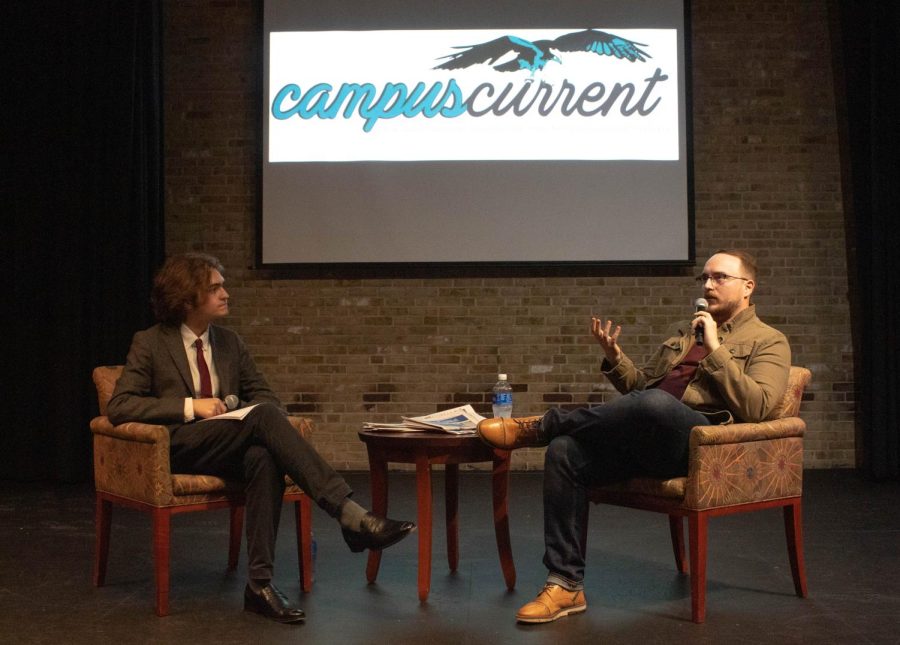Capital Gazette editor speaks on his career path, local journalism
Captial Gazette Editor Brooks DuBose, right, speaks to a crowd of students and faculty at a live interview on Tuesday.
April 10, 2023
The editor of The Capital Gazette, the daily newspaper covering Annapolis, said on Tuesday that artificial intelligence apps will never take the place of human reporters.
“AI can’t replace real reporting because[it] can’t generate an article like a real person,” Brooks DuBose, editor of The Capital Gazette, told students and faculty who attended a campus presentation.
DuBose, who became editor-in-chief in 2022, said it’s important to the community that local reporters “live and work in the same place as the people we serve.”
In response to a question from Campus Current Editor-in-Chief Sam Gauntt, who conducted an hour-long interview with DuBose in front of a live audience, he said Capital Gazette subscribers count on seeing the newspaper, which publishes print and digital editions, every day.
“It’s integral” to the community, DuBose said. “The people that still get mad at us for late papers will be the same people to stop us on the street and say, ‘Thank you.’”
Still, the editor said, the Capital Gazette, like most newspapers, struggles financially because advertising and subscriptions have fallen off.
“Gone are the days of ad revenue that allowed newspapers like The [Baltimore] Sun to have South African and Berlin desks and others around the globe,” DuBose noted. “In the ‘90s The Capital had 300 employees–that being reporters, fact checkers, editors and ad [staff]–but we are 10% of that now. We felt the squeeze like everyone else.”
Yet DuBose said newspapers are not dead.
“Nearly, life support probably,” he quipped in response to a question from Gauntt, who organized the event. “It’s the way it goes. We aren’t dead yet. We put out a paper every day.”
He said most newspapers, local and national, “are going away from [print editions], or they start to shrink down the number of days that they print. We haven’t gotten there yet, but there have been conversations.”
DuBose started at the Capital Gazette as a reporter in 2019, shortly after a gunman barged into the newsroom and shot and killed four reporters and a sales assistant. He said the incident changed the way the newspaper operates.
“They had to start from scratch to a certain degree,” he said. “The way things are done prior to June 28 are completely different from the way they were on the 29th and every day since then.”
Still, he said, “In the immediate weeks after that, they essentially just continued to do the work. I imagine it was a little quieter sometimes, but for the most part, things didn’t really change when it came to doing the job.”
DuBose, who has a master’s degree in journalism from the University of Maryland, worked for the student newspaper there,
He said the experience “helped me better understand how to be a journalist and write from a reader’s point of view.”
He encouraged the students in the audience, including a large group of Campus Current reporters and editors, to consider journalism as a career.
“It’s always great to go into a community event like this and, like, learn from what student journalists like you guys are doing and also tell the community what I’m doing, what we’re doing as a newspaper.”
He added: “It’s important to, you know, talk about journalism, share … how we do our job, kind of let people behind the curtain because, you know, I think it’s been lost a little bit. And it’s also cool to meet young journalists.”
Students said they enjoyed the event.
“I thought it was cool,” Miriam Huntoon, a first-year biology student, said.
Others said it was interesting to learn about how a major news organization works.
“I felt it was very refreshing to hear about, like, the ongoings of, like, an outlet,” said Kalvin Herold, a second-year communication student.












